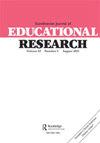How does the home learning environment contribute to private tutoring attendance? A study among Grade 8 students in Germany
IF 1.5
4区 教育学
Q2 EDUCATION & EDUCATIONAL RESEARCH
Scandinavian Journal of Educational Research
Pub Date : 2023-10-09
DOI:10.1080/00313831.2023.2266707
引用次数: 0
Abstract
ABSTRACTThis study investigated whether various aspects of the home learning environment – that is, learning-related processes, parental perceptions of their child, and structural characteristics – predicted private tutoring attendance in Grade 8. We used the data of 7393 students from the German National Educational Panel Study. Seventeen percent of eighth-graders took private tutoring. Logistic regression analyses revealed that parental perceptions of their children’s learning enjoyment and independence in Grade 7, and socio-economic status, a structural characteristic of the home learning environment, were positively associated with private tutoring attendance in Grade 8. However, neither the quantity (homework assistance) nor the quality of learning-related parent–child interactions in Grade 7 played a role. Besides replicating previous results on the role of socio-economic background, the study indicates that the decision to take private tutoring is not a simple reaction to poor achievement, but is adjusted to the child’s learning experience and parent-perceived need for support.KEYWORDS: Private tutoringshadow educationhomelearning environmenthomework assistance AcknowledgementsThis paper uses data from the National Educational Panel Study (NEPS): Starting Cohort Grade 5, http://dx.doi.org/10.5157/NEPS:SC3:11.0.1. From 2008 to 2013, NEPS data was collected as part of the Framework Program for the Promotion of Empirical Educational Research funded by the German Federal Ministry of Education and Research (BMBF). As of 2014, NEPS is carried out by the Leibniz Institute for Educational Trajectories (LIfBi) at the University of Bamberg in cooperation with a nationwide network.Disclosure statementNo potential conflict of interest was reported by the author(s).Authors’ contributionsConceptualisation: Anna Hawrot, Lena Nusser; Data curation: Anna Hawrot; Formal analysis: Anna Hawrot; Methodology: Anna Hawrot, Lena Nusser; Writing – original draft: Anna Hawrot, Lena Nusser; Writing – review & editing: Anna Hawrot, Lena Nusser.Availability of data and materialThe data that supports the findings of this study is available from the Leibniz Institute for Educational Trajectories (https://www.neps-data.de/Data-Center/Data-Access). Restrictions apply to the availability of this data, which is the reason why it cannot be provided by the authors of the study. Survey questionnaires are available on the NEPS study website (https://www.neps-data.de/Data-Center/Data-and-Documentation).Ethics approvalWritten informed consent was obtained from all participants of age and from legal guardians of underage participants prior to study enrolment. All participants could withdraw from the study at any time. The NEPS study is conducted under the supervision of the German Federal Commissioner for Data Protection and Freedom of Information (BfDI) and in coordination with the German Standing Conference of the Ministers of Education and Cultural Affairs (KMK) and – in the case of surveys at schools – the Educational Ministries of the respective Federal States. All data collection procedures, instruments, and documents were checked by the data protection unit of the Leibniz Institute for Educational Trajectories (LIfBi). The necessary steps are taken to protect participants’ confidentiality according to national and international data security regulations. All the analyses are secondary analyses of data published previously.Additional informationFundingThis work was supported by Bundesministerium für Bildung und Forschung.家庭学习环境对私人辅导出勤率有何影响?一项针对德国八年级学生的研究
摘要本研究调查了家庭学习环境的各个方面,即学习相关过程、父母对孩子的认知和结构特征是否能预测八年级学生的家教出勤率。我们使用了来自德国国家教育小组研究的7393名学生的数据。17%的八年级学生接受私人辅导。Logistic回归分析显示,家长对孩子七年级学习享受和独立性的认知,以及家庭学习环境的社会经济地位这一结构性特征,与八年级私教出勤率呈正相关。然而,七年级与学习相关的亲子互动的数量(家庭作业辅助)和质量都没有发挥作用。除了重复先前关于社会经济背景作用的研究结果外,该研究表明,接受私人辅导的决定并不是对成绩差的简单反应,而是根据孩子的学习经历和父母对支持的感知需求进行调整的。关键词:私人辅导、影子教育、家庭学习环境、家庭作业协助。本文使用的数据来自国家教育小组研究(NEPS):起始队列五年级,http://dx.doi.org/10.5157/NEPS:SC3:11.0.1。从2008年到2013年,NEPS数据是作为德国联邦教育和研究部(BMBF)资助的促进实证教育研究框架计划的一部分收集的。截至2014年,NEPS由班贝格大学莱布尼茨教育轨迹研究所(LIfBi)与全国网络合作开展。披露声明作者未报告潜在的利益冲突。概念化:Anna Hawrot, Lena Nusser;数据管理:Anna Hawrot;形式分析:Anna Hawrot;研究方法:Anna Hawrot, Lena Nusser;编剧:Anna Hawrot, Lena Nusser;写作-评论和编辑:Anna Hawrot, Lena Nusser。数据和材料的可用性支持本研究结果的数据来自莱布尼茨教育轨迹研究所(https://www.neps-data.de/Data-Center/Data-Access)。这些数据的可用性受到限制,这就是该研究的作者无法提供这些数据的原因。调查问卷可在NEPS研究网站(https://www.neps-data.de/Data-Center/Data-and-Documentation).Ethics)上获得批准。在参加研究之前,所有年龄的参与者和未成年参与者的法定监护人都获得了书面知情同意。所有参与者可随时退出研究。NEPS的研究是在德国联邦数据保护和信息自由专员的监督下进行的,并与德国教育和文化事务部长常设会议协调进行,在学校进行调查时,与各联邦州的教育部协调进行。所有数据收集程序、工具和文件均由莱布尼茨教育轨迹研究所(LIfBi)数据保护部门检查。根据国家和国际数据安全条例,采取必要措施保护参与者的机密性。所有的分析都是对先前发表的数据的二次分析。这项工作得到了德国联邦政府建设和发展基金会的支持。
本文章由计算机程序翻译,如有差异,请以英文原文为准。
求助全文
约1分钟内获得全文
求助全文
来源期刊

Scandinavian Journal of Educational Research
EDUCATION & EDUCATIONAL RESEARCH-
CiteScore
5.40
自引率
5.30%
发文量
70
期刊介绍:
The Scandinavian Journal of Educational Research is an international refereed research journal focusing on central ideas and themes in educational thinking and research. The journal welcomes reports on philosophical, historical, comparative, experimental and survey studies and has no preferences - except quality - concerning the authors" choices of methodological perspectives. The journal reflects ongoing educational research in the nordic countries. It also encourages scholarly discussions on vital concepts, new issues and themes of importance for education in the future.
 求助内容:
求助内容: 应助结果提醒方式:
应助结果提醒方式:


